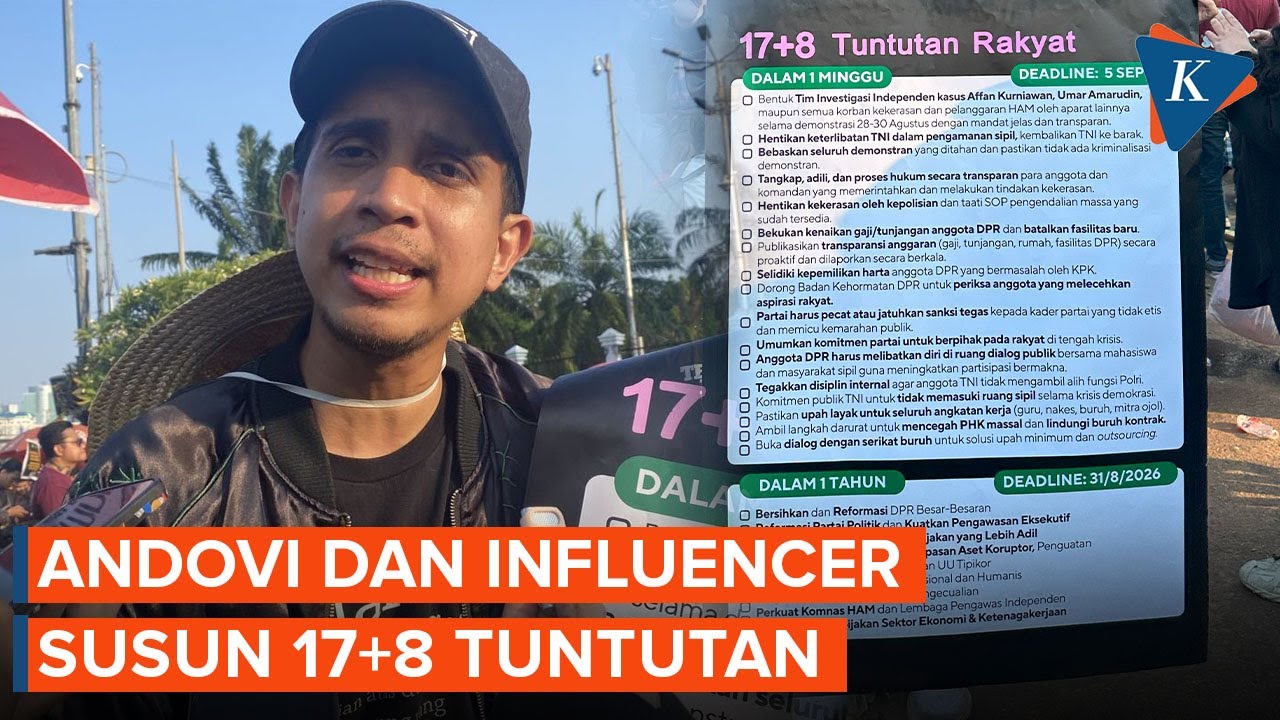
NGOCSTIP – Indonesia has entered a critical moment as protests surge in response to mounting public frustration. The movement gained momentum after revelations about lawmakers enjoying lavish perks during a period of national austerity. Sparked by outrage, the people mobilized across cities to voice their concerns over corruption, economic injustice, and systemic abuse. Influencers and civil society figures have united to submit what they now call the 17 plus 8 Peoples Demands.
These demands address core grievances such as police brutality, wealth inequality, and the erosion of democratic rights. With Jakarta as the epicenter, rallies have drawn tens of thousands, despite growing threats of violence and intimidation. Protesters believe that ignoring these demands would only fuel deeper unrest. They emphasize that the public’s patience has limits. In the face of growing resistance, all eyes are on parliament. The atmosphere is one of urgency, with citizens demanding change before more lives are lost in the struggle.
Indonesia now finds itself grappling with a level of civic unrest not seen in years. The protests have reached a boiling point as reports of police violence, wrongful arrests, and suppression tactics dominate the conversation. Many in Indonesia argue that these protests are the consequence of broken political promises and a failure to address growing inequalities. The official response from authorities has done little to ease public anger.
Although parliament stated it would review the demands, many citizens remain skeptical. Activists accuse officials of using delay tactics while hoping public outrage will fade. Meanwhile, videos of young demonstrators being dragged or beaten have circulated widely, fueling the fury. The sense of betrayal runs deep, especially among students and the working class who feel left behind by the country’s elite. Every hour without real reform only increases public determination. Trust in leadership continues to erode, as protesters vow to remain in the streets until action is taken.
The human cost of this movement is growing heavier by the day. At least six people have been confirmed dead since the protests began, including a 21-year-old student whose name now echoes through chants and posters. Stories of missing persons have emerged, with families begging for information as law enforcement denies responsibility.
Despite the danger, support for the protests grows stronger. People from all walks of life bring food, water, and supplies to the front lines. In cities across the country, murals and candlelight vigils honor those lost, transforming grief into resolve. The 17 plus 8 Demands have become a symbol of national unity. No longer just about political dissatisfaction, the movement represents a generational cry for dignity. While many are afraid, more are choosing to act. The spirit of solidarity runs deep in the chants, art, and presence of those risking everything for a more just Indonesia. The cost of silence feels far greater.
The 17 plus 8 Peoples Demands are not a random wish list. They represent carefully structured goals created through dialogue between activists, scholars, and community leaders. These demands address root causes of unrest such as corruption in state institutions, excessive use of force by police, exploitation of workers, environmental destruction, and shrinking space for civil liberties.
Protesters demand transparent investigations into protest-related deaths and call for an immediate end to authoritarian practices. They reject vague promises and insist on immediate action. Activists formally submitted the document to parliament during a dramatic demonstration in Jakarta. Protesters raised flags, delivered speeches, and shattered the silence. Media outlets covered the event widely, yet several lawmakers dismissed its importance. Observers warn that ignoring public demands could trigger broader instability. These demands outline a clear path toward reform and resolution. Politicians who choose delay and denial only deepen the crisis. The people voice their anger through every demand, refusing to stay silent any longer.
Tension within the halls of power is growing. Parliament’s leaders now face immense pressure not just from within the country but also from international observers tracking the violence and political response. A ticking clock defines the mood, with each day of inaction amplifying the potential for more chaos. While certain members have expressed openness to discussion, others treat the protest movement as a passing disturbance.
This attitude has triggered backlash from human rights organizations and academics who warn that history will judge what happens next. Young people continue to flood the streets with banners and songs. Parliament may try to maintain calm, but the ground beneath it feels increasingly unstable. Many fear that if the government refuses to meet this moment, future demonstrations will grow more intense. The people have spoken. They have mourned, marched, and organized. Now, they wait. The spotlight remains on the government as Indonesia prepares for whatever comes next.